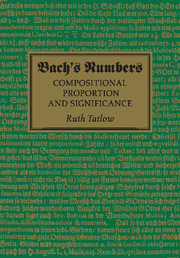Crossref Citations
This Book has been
cited by the following publications. This list is generated based on data provided by Crossref.
Nicolas, Patrice
2016.
J. S. Bach et la règle des octaves de musique : le prélude en do majeur (BWV 846) analysé sous un angle historique.
Les Cahiers de la Société québécoise de recherche en musique,
Vol. 17,
Issue. 2,
p.
73.
2016.
Publications Received.
Journal of the American Musicological Society,
Vol. 69,
Issue. 1,
p.
288.
Maddox, Alan
2017.
J.S. Bach’sSt. Matthew Passionand intellectual history.
Intellectual History Review,
Vol. 27,
Issue. 3,
p.
333.
Powrie, Phil
2017.
Music in Contemporary French Cinema.
p.
97.
Svistunenko, Tat'yana Anatol'evna
2019.
WEST EUROPEAN AND AMERICAN BRANCHES OF BACHOLOGY: AGREEMENT AND DISAGREEMENT.
Manuscript,
Vol. 12,
Issue. 6,
p.
196.
Alevizos, Konstantinos G.
2019.
Parameters of Stretto Use inside the Contrapunctus 5 of the Art of Fugue by Johann Sebastian Bach (BWV 1080, 5)1.
Revue musicale OICRM,
Vol. 6,
Issue. 1,
p.
142.
Alevizos, Konstantinos G.
2020.
The First Mirror inside the Contrapunctus 6 of the Art of Fugue by Johann Sebastian Bach (BWV 1080, 6)1.
Revue musicale OICRM,
Vol. 6,
Issue. 2,
p.
107.
Svistunenko, Tat'yana Anatol'evna
2020.
Dynamization of Da Capo Principle by the Example of J. S. Bach’s Clavier Fugues.
Manuscript,
Vol. 13,
Issue. 2,
p.
170.
MELAMED, DANIEL R.
2021.
‘PARALLEL PROPORTIONS’ IN J. S. BACH'S MUSIC.
Eighteenth Century Music,
Vol. 18,
Issue. 1,
p.
99.
2023.



